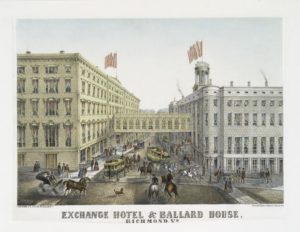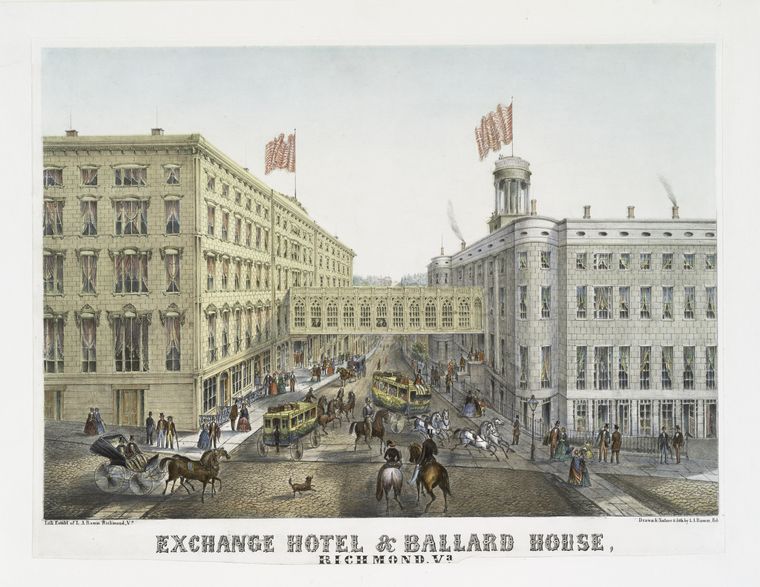Written by Rob Velella, August 17, 2009, as part of “The Edgar A. Poe Calendar: 365 Days of the Master of the Macabre and the Mystery“
 Edgar Poe presented an evening lecture on August 17, 1849, in Richmond titled “The Poetic Principle.” The lecture, which adapted a similar one presented in Providence, Rhode Island in December 1848, was held at the Exchange Hotel. It began at 8:00 p.m. and admission was 25 cents. Poe spoke to a room filled to capacity.
Edgar Poe presented an evening lecture on August 17, 1849, in Richmond titled “The Poetic Principle.” The lecture, which adapted a similar one presented in Providence, Rhode Island in December 1848, was held at the Exchange Hotel. It began at 8:00 p.m. and admission was 25 cents. Poe spoke to a room filled to capacity.
Poe’s appearance was a highly-anticipated event in the city which embraced him as one of their own. One newspaper proudly hailed him as “a native of this city [who] was reared in our midst.” Another hyped up the lecture in advance, advising its readers: “Those who desire to enjoy a real treat, should hear this effort of Mr. Poe’s.” The Richmond Whig newspaper teased that Poe would conclude by reciting “The Raven.”
His audience was not disappointed.
The Whig, despite looking forward to hearing “The Raven,” had apparently not expected much from Poe. After the lecture, they reported: “We attended the Lecture of Mr. Poe… with the expectation of hearing nothing more than the common dissertation upon the poetic faculty… We must say we were never more delighted in our lives.” The Daily Republican reported it was “one of the richest intellectual treats… The clearness and melody of his voice and the harmonious accentuation of his words were soul inspiring.” Novelist John Esten Cooke recalled that Poe “stood in a graceful attitude, leaning one hand on a small table beside him, and his wonderfully clear and musical voice speedily brought the audience under its spell. Those who heard this strange voice once never afterward forgot it… The lecture ended in the midst of applause.”
The content of the lecture on “The Poetic Principle” was distinctly Poe. One contemporary review notes that Poe denounced the didacticism in poetry as the “heresy of modern times” rather than allowing a poem to stand for beauty and nothing more. He spoke about specific authors and both praised and criticized as appropriate. Among those he mentioned was Edward Coote Pinkney, likely the American poet which Poe most admired. He also read from the work of Tennyson. Even journalist John M. Daniel, with whom Poe had once almost dueled, reluctantly admitted: “Mr. Poe is a man of very decided genius. Indeed, we know of no other writer in the United States, who has half the chance to be remembered in the history of literature” (though he rightly predicted his reputation would be based on a small number of works).
The irony might be that Poe lost his lecture notes before he made it to Virginia. That means he had to rewrite it just before taking the center stage.
“I never was received with so much enthusiasm,” Poe reported to his mother-in-law Maria Clemm. The lecture later became the essay of the same name, published posthumously. That manuscript is somewhat controversial; allegedly found after Poe’s death, it was first published by Rufus Wilmot Griswold in his collected works of Poe. The original manuscript was immediately lost after publication.

